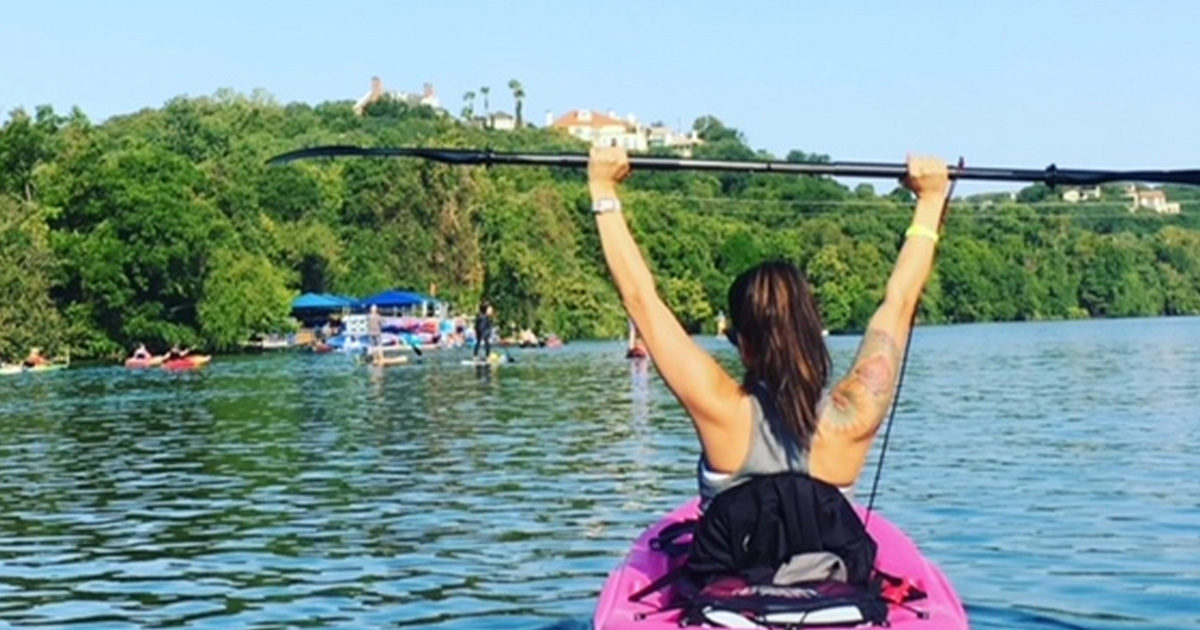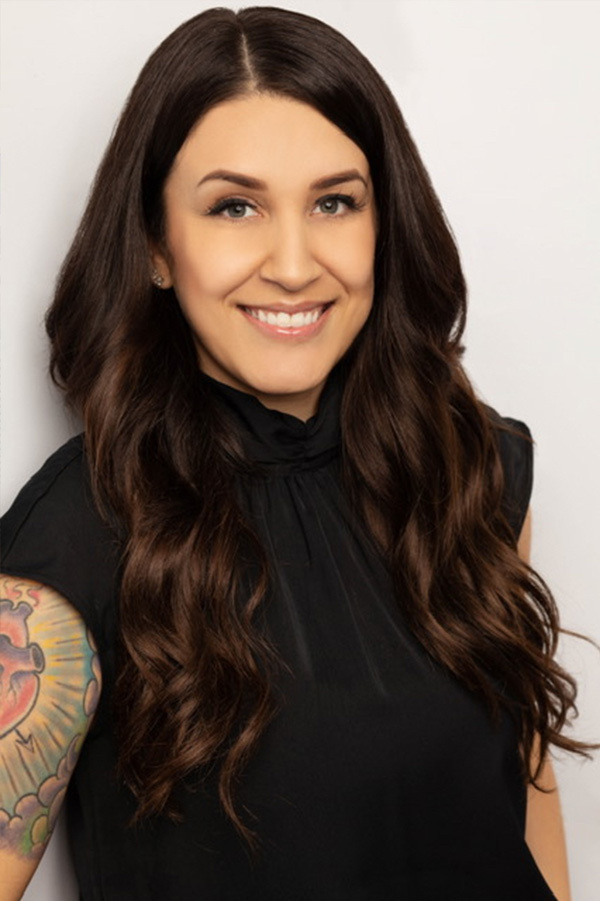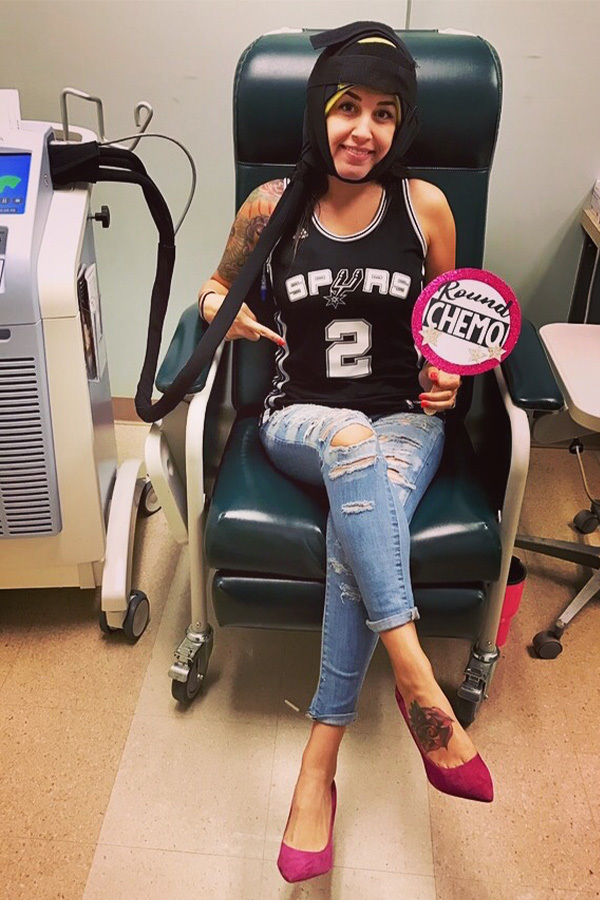A Patient Advocate Born Out of Personal Experience
From one woman’s journey with breast cancer emerges advocacy for needed change in cancer care
Reviewed by: Rebecca Muñoz and Tara Kaufmann, MD, MSCE
Written by: Lauryn Gerard

Rebecca Muñoz is both a special programs and projects intern for UT Health Austin’s Livestrong Cancer Institutes and serves as a board member on the Livestrong Cancer Institutes’ Young Adult Advisory Board all the while simultaneously wrapping up her Master of Public Health Degree, of which she is projected to graduate with in spring of 2021, from Baylor University. Rebecca is an impressive and hard-working young woman, whose passion for supporting and improving the lives of patients affected by cancer has started leaving a mark on the world. In 2017, when Rebecca was 29 years old, she was diagnosed with breast cancer, which flipped life as she knew it upside down. Her experiences - both good and bad - have shaped the person she is today and inspired change within the cancer community.

“I discovered a lump in my breast in May 2017 and it freaked me out, particularly because I have a longstanding family history of breast cancer and other types of cancer,” shares Rebecca. “Call it fear, or maybe intuition, but I just knew in the back of my mind this probably wasn’t good. I wanted to enjoy the last bit of fun before discovering the inevitable, so I put off getting checked until the end of summer so that I could enjoy traveling and relax some. As a healthy young woman, I didn’t have a whole range of doctors at the time, so I made an appointment at the end of summer with my OB/GYN who did a breast exam.”
Rebecca’s women’s health provider initially thought the lump in Rebecca’s breast was a cyst and reassured her she had nothing to worry about because she was “too young to have cancer.” After Rebecca explained her extensive family history of cancer, which included the loss of her maternal grandmother and her aunt to breast cancer, she was referred for a mammogram.
“It was a bit frustrating to experience my OB/GYN minimize the possibility of me having a breast cancer diagnosis,” explains Rebecca. “While it would have worried me to be thinking about having breast cancer before receiving an official diagnosis, in some ways it was harder to digest that the possibility of a breast cancer diagnosis wasn’t introduced up front. At the same time, I’m glad her response didn’t instill any kind of fear as I would have panicked regardless of the outcome.”
After her mammogram, the radiologist asked to speak privately with Rebecca, who was alone at the appointment, and gave her an unofficial diagnosis of cancer. A few days later, she received a call from her women’s health provider who confirmed her official diagnosis of invasive ductal carcinoma. Throughout the course of her cancer journey, Rebecca underwent six cycles of chemotherapy and had over seven surgeries, including a bilateral mastectomy as well as multiple revision surgeries. She battled serious infections, extreme side effects related to her chemo regimen, emergency hospitalizations, and the ongoing feeling of not being heard by her providers.
“I remember the first nurse I encountered at my Chemo Teach, where they walk you through what to expect during chemotherapy, laughed at me when I asked about cold capping as a potential method to save my hair,” recalls Rebecca. “I remember thinking, ‘I don’t want to hear about all the negatives right now; I’m going through something really scary, and I just want support.’ I actually left that center because of that nurse and traveled to another center all the way out in San Antonio that supported my use of cold caps, and I guess that was the first experience where I really took a stand for myself.

“I wanted to feel listened to, and I wanted to feel validated,” says Rebecca. “To some people it may seem silly or vain to be worried about keeping your hair during chemo, but for me it wasn’t about beauty or vanity, it was about keeping a sense of my identity and a sense of self during this period of time where I felt I had no sense of control over anything else. It didn’t matter if it worked, I was going to try.”
Cold capping is a method that can be used during chemotherapy treatments to help to preserve hair by protecting the hair follicle from chemotherapy drugs while still effectively targeting cancer cells. Because of her experience, Rebecca now manages a self-funded Chemotherapy Cold Cappers Facebook support group that has reached over 2,300 people who are interested in cold capping for themselves or supporting cold capping for others who are trying to save their hair during treatment.
“I was just kind of speaking up for myself,” says Rebecca, “and, at the time, I didn’t realize that I was doing a favor to others by sharing my story. As time went on, I found out that other women were interesting in cold capping, because they didn’t want their young children to know they were sick, or they just wanted to navigate their cancer journey in private. What started as a true passion project based on my own desire to connect with others about cold capping has grown to something bigger than I ever expected.”
Rebecca’s cancer diagnosis also sparked a passion for health and advocacy that she didn’t realize she had. She decided to pursue her graduate degree in public health and became involved in the Livestrong Cancer Institutes’ Young Adult Cancer Program, which led to her role on the Young Adult Advisory Board. This program addresses the specific needs of young adult patients (ages 18 to 39) related to their cancer diagnosis and treatment, including concerns about building and caring for a family, identity, education, career, finances, and more. Additionally, social, emotional, and mental health support is also available.
“A young adult experiences cancer very differently than an older person or even a pediatric patient,” explains Rebecca. “Having a cancer diagnosis puts you in this unique category in which you didn’t look old enough to be sick, but you’re also not young enough to be a pediatric patient, struggling to understand the severity of your situation. It’s such a pleasure to serve on the board of this amazing group and be able to share my experience with others. We all come from different socio-economic backgrounds and have navigated different cancer journeys, and I think it’s really valuable for people to have connections to a support group like this,” says Rebecca.
Rebecca’s graduate coursework required her to complete an internship, and her involvement on the Young Adult Advisory Board led her to reach out to the program leaders at the Livestrong Cancer Institutes. Her experience has brought attention to the gaps in support for young adults battling cancer and since joining the Livestrong Cancer Institutes team, she has become fully immersed in cancer patient advocacy.
“I thought, ‘What better place to work at than the Livestrong Cancer Institutes at UT Health Austin?’ because I had already fallen in love with this organization and how they treat their cancer patients and wanted to be a part of it and learn more,” explains Rebecca. “I tell people that I love to be able to pay it forward and doing this work while also being able to share my own personal experiences to help people is extremely rewarding.”
Rebecca works closely with the Livestrong Cancer Institutes on identifying needs in patient education, research, and evaluation initiatives, including the evaluation of the Livestrong Cancer Institutes’ CaLM cancer care model. Recently, she has helped with the launch of the new Breast Cancer specialty now offered through the Livestrong Cancer Institutes led by medical oncologist Tara Kaufmann, MD, MSCE. She also served as a collaborator and patient advocate on the 2020-2021 CHER grant team that partnered with the Breast Cancer Resource Center (BCRC) to address the unmet needs of young women being treated for breast cancer in central Texas and beyond. She is excited to experience this growth first-hand and looks forward to seeing the impact it will make for patients with a breast cancer diagnosis in the Austin area and beyond.
“Being a part of the cancer world is really challenging. I like to remind people that you’re going to have your good days and your bad days, and if you’re going to have a bad day, let yourself have that bad day; don’t be hard on yourself. In addition to continuing my work with cold capping, I would like to explore more opportunities in which I can help enhance the cancer care experience and communications strategies for the young adult population as well as for people of color, particularly the Latinx community as they are very underserved and face a lot of barriers in health care. That’s something that really fires me up to make a change,” shares Rebecca.
UT Health Austin clinicians are proud to serve alongside survivors, such as Rebecca, whose shared experiences help support the ongoing mission of driving change in health care to deliver a better experience for patients in the care room and beyond.
For more information about the 2020-2021 CHER grant initiative, visit here.
For more information about the new Breast Cancer specialty offered through the Livestrong Cancer Institutes, visit here.